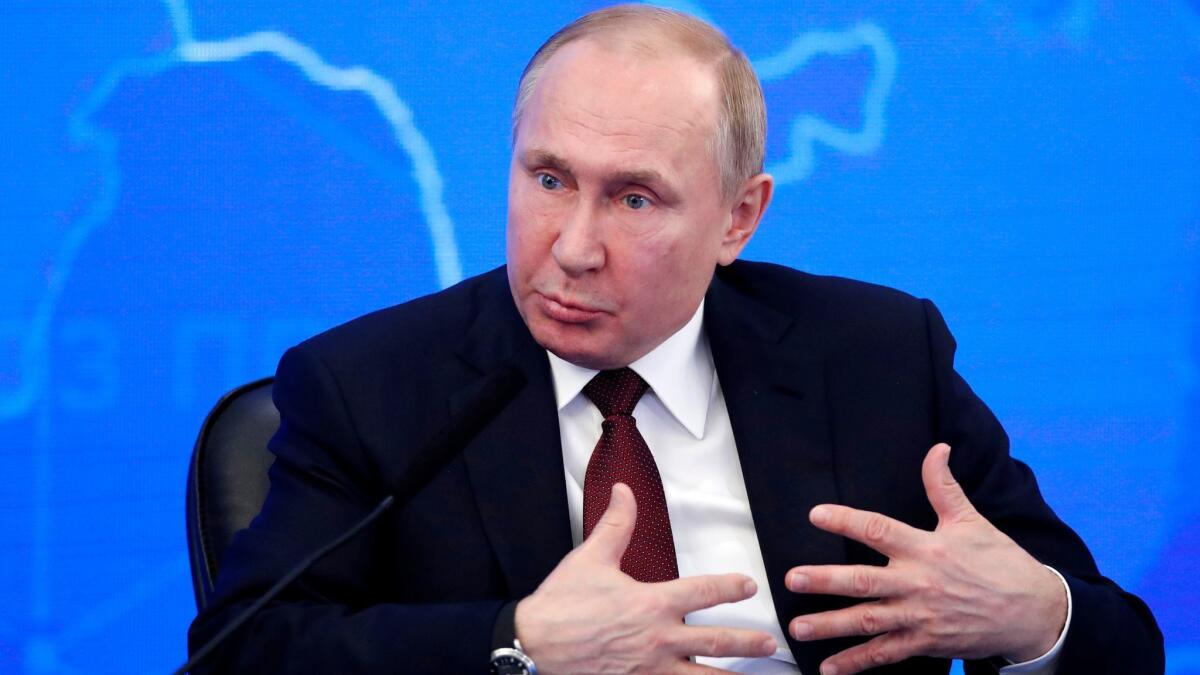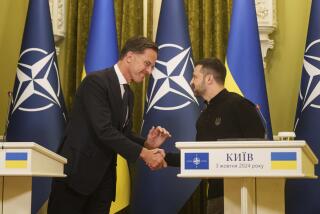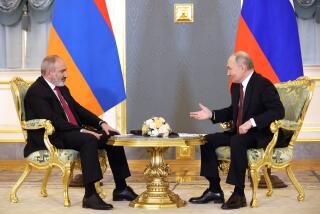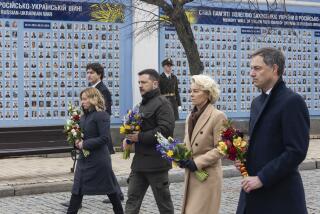Putin visits Crimea to mark 5th anniversary of annexation

- Share via
Reporting from Moscow — Russian President Vladimir Putin marked the fifth anniversary of Russia’s annexation of Crimea from Ukraine by visiting the Black Sea peninsula on Monday, as NATO and the European Union once again strongly condemned the land grab.
Putin began his trip by attending the launch of new power plants in Crimea, part of Moscow’s efforts to upgrade the region’s infrastructure. Ukraine has cut off energy supplies to the peninsula and blocked shipments of Crimea-bound cargo via its territory after Moscow annexed the region in 2014.
“The situation has changed radically,” Putin said, adding that the new power facilities will fully cover Crimea’s needs.
Russia’s modernization effort has included the construction of an 11.8-mile bridge that opened last year across the Kerch Strait, which links the Black Sea and the Sea of Azov. The $3.6-billion project gave Crimea a land link to Russia. Previously, a ferry crossing that was often interrupted by gales served as the only connection.
Russia has also beefed up its military presence in Crimea with new navy ships, missiles and warplanes.
Russia’s annexation of Crimea drew U.S. and EU sanctions against Russia that hurt its economy.
NATO allies said in a statement Monday, “We strongly condemn this act, which we do not and will not recognize.” They also criticized Russia’s military buildup in Crimea and alleged rights abuses including “arbitrary detentions, arrest, and torture” against members of the Crimean Tartar community.
EU foreign policy chief Federica Mogherini said, “We stand in full solidarity with Ukraine, supporting its sovereignty and territorial integrity.”
NATO and the EU also called for the release of Ukrainian seamen who were seized by Russia in November’s standoff in the Black Sea.
Putin claims that Russia “re-integrated” Crimea after the ouster of Ukraine’s former pro-Russian president in 2014 to protect ethnic Russians who made up the majority of Crimea’s population from Ukrainian nationalists. The Kremlin was also worried that a new Ukrainian government could annul Russia’s lease on its key Black Sea navy base in Crimea and welcome NATO there instead.
Crimea was first seized by Russian forces in the 18th century under Catherine the Great.
The 10,425-square mile territory, roughly the size of Massachusetts, became part of Ukraine in 1954 when Soviet leader Nikita Khrushchev transferred jurisdiction from Russia, a move that was a mere formality until the 1991 collapse of the Soviet Union meant that Crimea landed in an independent Ukraine.
The Kremlin has argued that Khrushchev’s move violated then-Soviet law, making the transfer illegitimate.
Russian troops swept Crimea just days after the February 2014 ouster of Ukraine’s Russia-friendly president, catching the West by surprise. The Russian forces blocked Ukrainian soldiers at their garrisons, setting the stage for a hastily called referendum in Crimea that the West denounced as illegitimate.
Putin said he put Russia’s nuclear forces on combat readiness during the 2014 developments in Crimea and warned his Western counterparts that Moscow was ready to defend what it considered its land. The annexation gave Russia hundreds of miles of coastline along the Black Sea, a near stranglehold on commerce in the Sea of Azov and access to vast potential energy riches on the Black Sea shelf.
The U.S. and the EU have responded to the annexation of Crimea and Moscow’s support for a separatist insurgency in Ukraine’s east with waves of sanctions that have limited Russia’s access to global financial markets and to energy and defense technologies. The Kremlin fired back by cutting imports of most Western food.
The annexation of Crimea, a lush peninsula that long has been a favorite vacation destination for Russians, helped bolster Putin’s popularity at home and strengthened Moscow’s positions in the Black Sea. Public enthusiasm in Russia about the land grab, however, has worn off over the years amid the country’s economic difficulties and a plunge in living standards.
More to Read
Sign up for Essential California
The most important California stories and recommendations in your inbox every morning.
You may occasionally receive promotional content from the Los Angeles Times.










